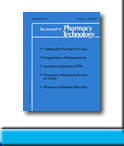 |
 |
A PHARMACOTHERAPY CLINIC IN A NEUROLOGIC PRACTICE
Melanie P Swims and Pamala Reed
To request full article click here.
BACKGROUND: Limited information exists on therapeutic drug monitoring of neurology patients. Although multiple reviews on anticoagulation clinics have shown good outcomes, the therapeutic endpoints achieved in patients enrolled in a pharmacotherapy clinic serving only those with a history of stroke/transient ischemic attack (TIA) have not been noted previously.
OBJECTIVE: To illustrate the drug therapy management role of a pharmacotherapist in a neurology clinic and provide evidence on the quality of the service by presenting data on therapeutic endpoints in the subset of patients who are on anticoagulant therapy for stroke prevention.
METHODS: Reported therapeutic endpoints included recurrent stroke/TIA, bleeding, time in therapeutic range (international normalized ratio [INR] range 2–3), adherence, and patient satisfaction with pharmaceutical care. Patients completed the Morisky self-report compliance questionnaire and the Pharmaceutical Care Satisfaction Questionnaire. Other information included medical history, medications, anticoagulation rationale, referring service, and therapeutic endpoints.
RESULTS: There were few adverse outcomes of bleeding or stroke. Time in therapeutic range for an INR of 2–3 was 59.67%. Of 251 INRs, 2 (0.8%) were greater than 5. Patient satisfaction with pharmaceutical care was high, as was adherence.
CONCLUSIONS: The incidence of recurrent stroke/TIA and bleeding was rare, despite the inherently higher bleeding risk for stroke patients. Times in range of INRs were equivalent to those of other anticoagulation clinics. Patient satisfaction and adherence were good despite polypharmacy. Pharmacotherapists can be valuable additions to neurology clinics by helping neurologists in the management of the pharmacotherapy of their patients, including those on anticoagulation therapy for stroke/TIA.
J Pharm Technol 2006;22:254-60.
To request full article click here.
|
|
|
||
|

